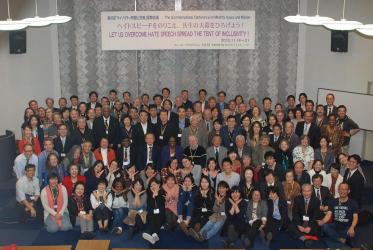Displaying 41 - 60 of 71
07 April 2016
Consultation considers right to food in context of climate change
15 December 2015
Japanese churches discuss minority issues
01 December 2015
WCC welcomes the peaceful elections in Myanmar
18 November 2015
Land rights focus of panel discussion
17 November 2015
Climate pilgrimage toward COP21 pauses in Geneva
05 November 2015
A humble man firmly rooted in faith
20 August 2015
WCC Executive Committee speaks out on migrant crises
12 June 2015









